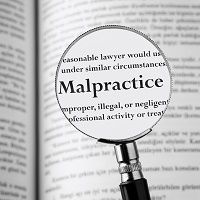- Best Practices New Normal
- Digital Dentistry
- Data Security
- Implants
- Catapult Education
- COVID-19
- Digital Imaging
- Laser Dentistry
- Restorative Dentistry
- Cosmetic Dentistry
- Periodontics
- Oral Care
- Evaluating Dental Materials
- Cement and Adhesives
- Equipment & Supplies
- Ergonomics
- Products
- Dentures
- Infection Control
- Orthodontics
- Technology
- Techniques
- Materials
- Emerging Research
- Pediatric Dentistry
- Endodontics
- Oral-Systemic Health
Recovering from a Setback: A Dental Malpractice Case
In this second part of our series on financial calamities, we look at the steps you should take after facing a malpractice suit.

We often include this disclaimer when talking about matters involving litigation or tax advice, but this time we want to spell it out front and center: this article should not, under any circumstances, be considered or used as legal advice. In fact, this article won’t even pretend to offer guidance on how to defend yourself against a malpractice case. Rather, the information provided here is simply a look at steps to take after a malpractice case has either been decided or settled.
Assess the Practice
Obviously one of the first things you’ll need to do, particularly if you have lost a malpractice case, is figure out if there is lasting damage to the practice. This damage can come from several distinct areas:
- Financial penalties and/or restricted licensures
- Damage to the reputation of the practice
- Damage to your personal reputation
- Need for shifting to or away from certain dental practices
Any or all of these can be difficult to overcome. But the important thing to remember is that generations of dentists before you have overcome them. Yes, you can overcome being associated with a dental malpractice suit, which depending on the state where you practice is public information and is easily accessible. Work with your attorney or malpractice insurance firm to make sure you’re clear on what you can and can’t say to current patients who may have questions.
Assess the Self
One aspect of dentistry that many who chose the career like is the autonomy. But being the person in charge can be a double-edged sword. Even if you were not directly responsible for the litigation, as the practice leader, anything that happened could be considered your ultimate responsibility.
Since the case is now over, don’t dwell on what went wrong, particularly if you’ve taken the right steps to correct the issue. Rather, look to the future health of yourself and the practice. Even the best dentists have likely faced some sort of administrative action or patient complaint over the course of their careers. Stay focused on the bright future ahead.
Button Up
Not every malpractice case can be avoided, of course, but there are things you can do to decrease your chances of future litigation. We have covered this topic previously here and here, but beyond the important steps outlined in those articles, you may want to consider:
- An in-depth review of the practice’s policies, perhaps with input from current staff and any other partners. Chief among your considerations for review should be safety practices and recordkeeping practices. Documentation is a crucial part of both avoiding and preparing for malpractice cases.
- A de-brief with your staff on what initiated the suit, what the result was, and what (if anything) could have been done differently.
- A review from an independent legal firm that specializes in dental malpractice, so that you can be certain that if the situation arises again, it won’t be out of negligence.
- A refresher on current medical malpractice law and recent cases in your area.
Get Away?
Win or lose, the stress of fighting a malpractice case can leave you drained, physically and emotionally. If you’re in position to do so, you should consider some time off around the time a decision on your case is expected. Consider talking to colleagues you trust who may have been in a similar situation, or even a professional counselor if the ordeal has been particularly tough. The worst-case scenario is to jump right back into patient care if you’re not ready to do so with confidence and clarity.
In Part 3 of this series, we’ll look at recovering from financial plans that have become derailed.
